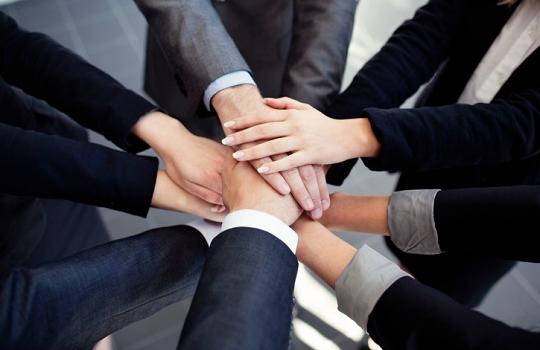I have always had a keen interest in sport, of any kind really….watching it, playing it…rugby, athletics, tennis and, more recently, golf (under duress) and cycling (only gentle encouragement needed). So when the Tour de France descended on the beautiful Yorkshire countryside recently, I felt compelled to go and observe the technicolor shirts of the peloton weave their way through the narrow streets of Mytholmroyd.
As I watched, I couldn’t help but be amazed and totally inspired. Talk about team work. These guys were a well-oiled, highly efficient, organised team with a plan… a real force to be reckoned with. Individuals lay themselves on the line, give everything they have and sacrifice their own aspirations and interests for the good of the team. But why? Cycling isn’t a team sport in the sense that I am familiar with. In cycling, only one guy stands on the podium…there is only one official winner that gets the glory, so why do they do it?
I was reminded of Harry Trueman’s quote: “It’s amazing what you can accomplish when you do not care who gets the credit”…. So it seems. This is all very well in theory but how do you get people to actually buy into that ideal in practise?
For the answer, I looked towards team Sky. In 2010 Dave Brailsford had a clear vision – to have the first British rider win the Tour de France within five years… he managed it in two. This got me thinking, the correlation between cycling and workplace team effectiveness in undeniable. What lessons can we take from team Sky to help us be more effective in our own teams?
Clear vision
Firstly you need a vision, a purpose if you will, and that vision needs to be crystal clear. Team members need to understand how that vision and purpose translates into individual roles and responsibilities. If you are to achieve your team goals every member of the team needs to be aligned with that purpose.
Strong leader
You then need to build a team to achieve that purpose and that starts with a strong, clear leader who can garner the support of others. That leader cannot drive a team to success on their own, they need help – competent individuals with key strengths and capabilities that support the team purpose. When you combine these strengths into a team, they become a formidable unit that can achieve absolutely anything.
Identify strengths and weaknesses
Individual performance needs to be refined. The team needs to work together/train together to identify individual strengths and weaknesses and develop a strategy to capitalise on these strengths. Even strengths need to be tweaked and refined, Brailsford talked about marginal gains; identifying key ‘touch points’ and adding 1% to generate improvement. It is the culmination of these 1% improvements right across the team that puts us ahead of the competition.
Team flexibility
There needs to be flexibility within the team to adapt and change to the environment as required. Take this year’s Tour for example. Team Sky’s plan A was to work towards a Chris Froome victory; Brailsford even said that there was no real plan B. When Froome crashed out in the early stages the team had to change tactic and ride to support Richie Porte….plan B? There is some debate as to how successful (or not) that was, but the point is that the team cannot be too rigid. Things change rapidly within organisations and we need to be in a position to react.
Make sacrifices
There is no room for egos in a highly effective team, there is a job to be done and, in order to achieve this, the team needs to be cohesive. Sacrifices need to be made for the greater good and when individuals abandon the plan in pursuit of their own agenda, cracks start to appear. In order to motivate a team to make these sacrifices, it is important to acknowledge their contribution. Mark Cavendish is an excellent example of this. As leader of the Omega Pharma-Quick Step team, he always credits his team highly when he wins a sprint. There is no ego, there is no me, it is a team effort!
See the bigger picture
And finally it’s important to recognise that every team has bad days but these do not necessarily have to be a big deal. There is a bigger picture, a greater purpose and you can probably catch up. If, as a team, you ‘fall off your bike’ pick yourself up, readjust your crash helmet and get back to the task in hand. After all, the Tour isn’t won in a day.










One Response
The right kind
You do need egos, but you need the right kind of egos. You don't get great leaders without egos, but you do get great leaders who have learned to control and direct the passion and drive their egos produce. It's not about them as an individual, it's about the team (and by implication, their leadership…).
Enlightened self-interest is a massively powerful force for change, but so many people miss out the 'enlightened' part.
It's nice to have a great leader, but if you have such in your organisation, they may well already be busy with 15 other things. You might like to try making one, or just let the team work out for themselves who their leader is going to be. It's amazing what people will pull out of their bag of tricks once they realise they have a team reliant on them. Regular feedback from the team that just made them leader will help keep any fevered egos under some degree of control.